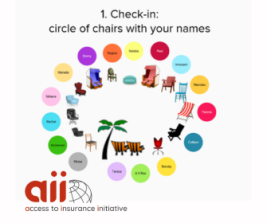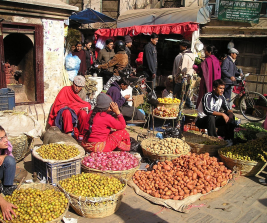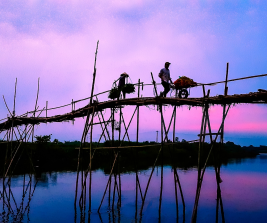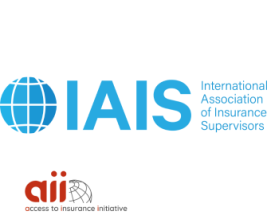The pandemic proposition – a stronger insurance front for sustainable development
The pandemic proposition – a stronger insurance front for sustainable development

Imagine if every year the population of an entire country the size of the Philippines fell into poverty because of out-of-pocket expenditures on health services. The WHO data on global health coverage presents a sombre picture. Every year 100 million people are pushed into poverty because of lack of health coverage; that without the burden of a global pandemic.
'People need health insurance at a time of a pandemic, but they need it when there is no pandemic, too', Craig Thorburn from the World Bank put it simply during the 1st Pandemic Risk Webinar the A2ii and the IAIS held mid-2020. At the occasion, Arup Chatterjee (Asian Development Bank - ADB), Jan Kellett (United Nations Development Programme - UNDP) and Lesley Ndlovu (African Risk Capacity) together with Thorburn presented, in a rich discussion, ongoing and planned initiatives and programmes to close the (pandemic) protection gap to what was mostly insurance supervisory audience.
Interestingly, what originated as a discussion on pandemic risk gravitated towards the core challenges common to a decade’s worth of efforts to support inclusive insurance market growth.
Emergency public institutions’ response
This is not to say that pandemic-targeted public initiatives were lacking at the outset.
The ADB provided budgetary support of 20 billion dollars for the worst impacted countries, to save lives and ensure economic rebound. The National Disaster and Risk Management Fund in Pakistan was channelling funds to provincial governments and directly to the beneficiaries. Indonesia, India and Nepal requested funds for insurance of frontline health workers through domestic insurance companies.
In Africa, the African Risk Capacity epidemics product, a multistakeholder initiative set to tackle public health emergencies, was in the planning even before Covid-19.
Similarly, in addition to the immediate emergency budgetary support, the World Bank’s Pandemic Emergency Financing Facility was in place in advance of the pandemic.
As the pandemic unfolded, we have also seen an impressive speed and amplitude of the country-level supervisory responses to the crisis. Loraine Van Deventer, the A2ii Coordinator for Sub Saharan Africa already in May 2020 wrote about South Africa’s relief measures, the FSCA’s communications to insurers, and the publication of guidelines for customers.
At the same time, and as Jonathan Dixon (International Association of Insurance Supervisors - IAIS) pointed out in his opening message of the First Pandemic Risk event, the IAIS and the A2ii rapidly responded in supporting supervisors by tracking and sharing experiences across jurisdictions, among others.
From band-aid measures to a stronger insurance front?
Much of the supervisory activity, however, has been impromptu. The underlying vulnerabilities remain, and many people still do not have any coverage. This is an opportunity for inclusive insurance actors to emerge stronger and seize the opportunity of a spotlight on the need to increase resilience.
In Africa, for example, there are still millions of people without universal healthcare. There is a large informal sector where people have to earn a living every day and the formal sector- SMEs – are just as fragile. All the while droughts, floods and other natural catastrophic events continue leaving disastrous consequences behind.
Governments are the entry points to providing new solutions, by the nature of their work in creating an enabling environment, their reach and their convening power.
What does it take to change things at scale? With this question, Jan Kellet introduced UNDPs Tri-Partite Initiative with the IDF and BMZ looking at 20 countries, integrating risk modelling and risk analytics into public financial management. Cooperation between the insurance industry and the development sector is at the heart of this initiative.
The World Bank has been engaging with the industry to understand how they have been responding to the emerging issues and monitoring supervisory initiatives, developing examples and datasets. Notwithstanding, Thorburn sees an opportunity here to step forward and create an understanding of what customer is really saying they need, be it business interruption coverage not dependant on anything else or the way health services are delivered.
The African Risk Capacity was set to provide the governments with risk-modelling capacity, to enable them to understand exposure to Covid-19 and other diseases. While the ’ARC’s ambition is to reach as many vulnerable people as possible, governments are, in the words of Lesley Ndlovu, the entry points to providing new solutions, by the nature of their work in creating an enabling environment, their reach and their convening power.
Sustainable development powered by technology remains the focus of ADB. Arup Chatterjee gave an overview of the ADBs schemes for trade, supply and SMEs finance, crucial for the support of the economic growth, as well as schemes for low wage workers, protection of poor and vulnerable with a focus on women and girls in the area of social protection. The ADB is looking into post-Covid-19 recovery, looking at cooperation models for insurance and banks to develop innovative solutions. All these programmes come with robust insurance and financial awareness component.
The case for accelerating financial inclusion
If this were a different type of telling, the narrative arc would lead us to the Big Solution at this point. In reality, things seem to be taking a different turn. Countries, still grappling with the pandemic, might not be ready for forward-looking policy interventions for medical insurances or business interruption just yet.
We had thought that we might have to get involved in helping client countries put in place arrangements whereby pandemic type coverage could be made available, Craig Thorburn wrote to us in a recent exchange on the topic, This may have meant governments or industry associations working together to create a pool that then accesses risk coverage from the international market or through index-based products or a mixture.
However, so far, this has not been a topic in great demand, and it is good to see that some private sector solutions have been explored. So I think there may be less need for policy-level intervention. Many of the people who would be looking to see these questions answered and solutions developed are not yet asking for action – they are still dealing with today’s issues first, concludes Thorburn.
Nevertheless, Covid-19 has both revealed the need for new types of coverages but also weaknesses in existing covers. It highlighted the limitations of what could be insured and the need for public-private formal and informal partnerships, knowledge sharing among stakeholders and countries. Only by means of collective efforts and mechanisms powered by capacity-building of supervisors can Covid-19-accelerated digitalisation in the insurance sector drive meaningful innovation and the emergence of new and improved insurance solutions.
The support of international financial institutions and the development community is vital in tackling the current crisis but also for keeping a close eye on the 2030 development agenda, accelerating financial inclusion and particularly the role of insurance within.
The Pandemic Webinar Series is a joint initiative of the A2ii and the IAIS. The webinars included multistakeholder and supervisors-only dialogues. The recordings of the multistakeholder dialogues are available under the Dialogues Events on the A2ii website.
Share this article
Also in Blog















